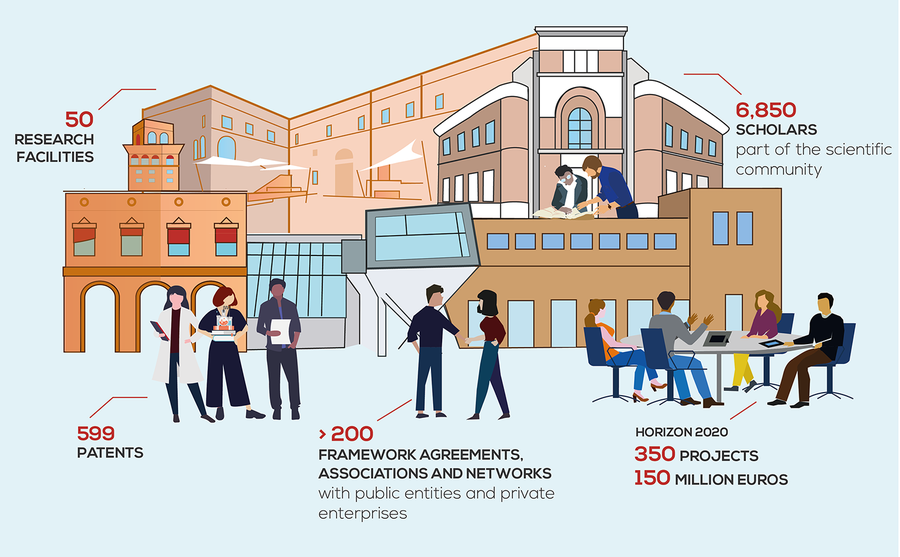
Scientific research has always been at the heart of the activities of the Alma Mater
The oldest university in the Western world was founded in 1088, the year in which Bologna became the first seat of free and independent teaching.
When Frederick I, also known as Barbarossa, established absolute freedom of research in the 12th century, the University of Bologna recognised its fundamental value and, today, it still promotes scientific development on a national and international level, while remaining deeply rooted in the local community.
In line with the sustainable development goals of the UN 2030 Agenda and the objectives of the National Recovery and Resilience Plan (NRP), the University of Bologna, contributes to enhancing the value of research as a fundamental tool for strengthening the social responsibility of its community and fostering the application of the principles of equity, sustainability, inclusion and respect for diversity.
People and facilities
Research at the Alma Mater is first and foremost done by people
The scientific community of the University of Bologna counts 6,850 scholars: 3,122 between teachers and researchers, 2,430 PhD students, and 1,298 research fellows.
A multicampus University, with research and training facilities
The Alma Mater has 5 Campuses and a branch abroad to diffuse teaching programmes and carry out stable research activities across the territory.
A total of 50 facilities are involved in research: 31 Departments, 12 Research and Training Centres, 7 Interdepartmental and Industrial Research Centres.
Projects and collaborations
The Alma Mater develops and supports research collaborations with universities, research institutions and the industry
The University of Bologna has entered 90 framework agreements with universities, public entities and research centres, and 49 with private enterprises, to establish long-term collaborations that allow a wide range of strategically planned activities and initiatives. Furthermore, it has joined 80 between regional, national, and international associations and networks to promote research activities and collaborations.
The University of Bologna engages in competitive research both nationally and internationally
In the new European framework programme for research and innovation, Horizon Europe, 92 projects have already been approved, 16 of which are coordinated by the University of Bologna. These include six ERC Excellence Projects.
Horizon 2020, the EU funding programme for research and innovation, has funded over 350 projects, 98 of which coordinated by the University of Bologna, for a total amount of over 150 million euros. The number of partners involved totalled more than 3,000, of which more than 1,600 private.
Over 40 projects have been funded in relation to the Interreg, LIFE, and Creative Europe programmes, for a total of over 10 million euros.
With regard to Projects of Particular National Interest (PRIN), of the 62 projects (PRIN 2020), 40 have Alma Mater members in the role of national coordinators and of the 134 projects (PRIN 2017) funded, 40 have Alma Mater members in the role of national coordinators.
The 14 Alma Mater Departments of excellence involved in the initiative promoted by MIUR, have invested more than 113,8 million euros: over 14 million euros in high qualification teaching activities, over 19 million euros in infrastructures, and over 108 million euros in staff recruitment.
The University of Bologna has developed a number of university calls for applications: "Alma idea" to reward the most innovative ideas and project proposals of its researchers; "Alma Attrezzature" to encourage the renewal, upgrading and sharing of research equipment; "Alma scavi" to promote archaeological digs and field research; and "AlmarieCurie" to strengthen the "Marie Sklodowska-Curie Actions" (MSCA) of the European Commission's Horizon Europe Framework Programme for Research and Innovation.
Research and innovation
The University of Bologna promotes innovation, the creation of enterprises and technology transfer in order to bring research into society and into the local community.
This has led to the creation of 37 active and accredited spin-offs and 12 accredited start-ups. As well as 599 active patents.
